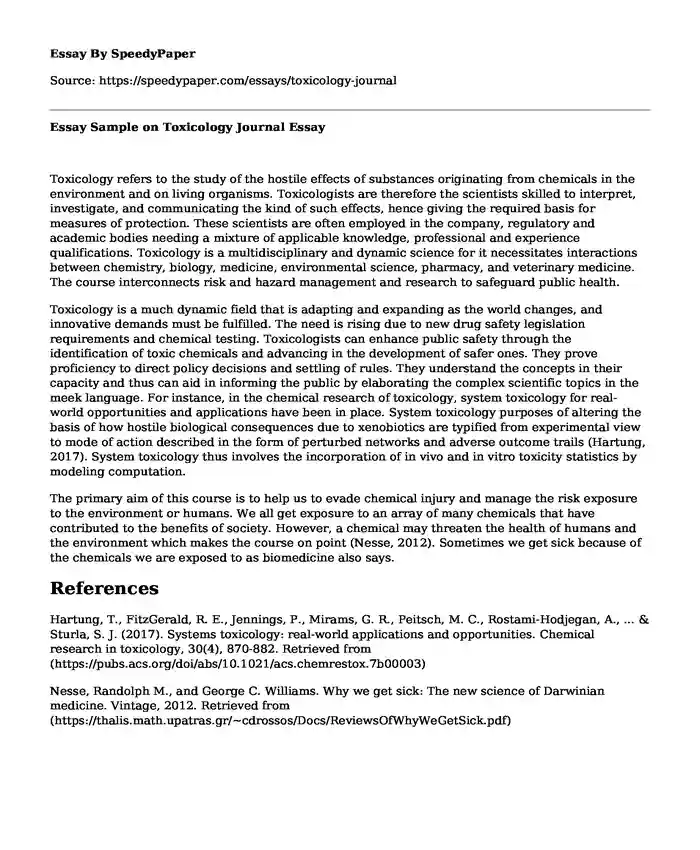
| Type of paper: | Essay |
| Categories: | Ecology Chemistry Public health Social responsibility |
| Pages: | 2 |
| Wordcount: | 412 words |
Toxicology refers to the study of the hostile effects of substances originating from chemicals in the environment and on living organisms. Toxicologists are therefore the scientists skilled to interpret, investigate, and communicating the kind of such effects, hence giving the required basis for measures of protection. These scientists are often employed in the company, regulatory and academic bodies needing a mixture of applicable knowledge, professional and experience qualifications. Toxicology is a multidisciplinary and dynamic science for it necessitates interactions between chemistry, biology, medicine, environmental science, pharmacy, and veterinary medicine. The course interconnects risk and hazard management and research to safeguard public health.
Toxicology is a much dynamic field that is adapting and expanding as the world changes, and innovative demands must be fulfilled. The need is rising due to new drug safety legislation requirements and chemical testing. Toxicologists can enhance public safety through the identification of toxic chemicals and advancing in the development of safer ones. They prove proficiency to direct policy decisions and settling of rules. They understand the concepts in their capacity and thus can aid in informing the public by elaborating the complex scientific topics in the meek language. For instance, in the chemical research of toxicology, system toxicology for real-world opportunities and applications have been in place. System toxicology purposes of altering the basis of how hostile biological consequences due to xenobiotics are typified from experimental view to mode of action described in the form of perturbed networks and adverse outcome trails (Hartung, 2017). System toxicology thus involves the incorporation of in vivo and in vitro toxicity statistics by modeling computation.
The primary aim of this course is to help us to evade chemical injury and manage the risk exposure to the environment or humans. We all get exposure to an array of many chemicals that have contributed to the benefits of society. However, a chemical may threaten the health of humans and the environment which makes the course on point (Nesse, 2012). Sometimes we get sick because of the chemicals we are exposed to as biomedicine also says.
References
Hartung, T., FitzGerald, R. E., Jennings, P., Mirams, G. R., Peitsch, M. C., Rostami-Hodjegan, A., ... & Sturla, S. J. (2017). Systems toxicology: real-world applications and opportunities. Chemical research in toxicology, 30(4), 870-882. Retrieved from (https://pubs.acs.org/doi/abs/10.1021/acs.chemrestox.7b00003)
Nesse, Randolph M., and George C. Williams. Why we get sick: The new science of Darwinian medicine. Vintage, 2012. Retrieved from (https://thalis.math.upatras.gr/~cdrossos/Docs/ReviewsOfWhyWeGetSick.pdf)
Cite this page
Essay Sample on Toxicology Journal. (2023, Jan 04). Retrieved from https://speedypaper.net/essays/toxicology-journal
Request Removal
If you are the original author of this essay and no longer wish to have it published on the SpeedyPaper website, please click below to request its removal:
- Free Essay on How to Make Electricity
- Free Essay on Augmenting Productivity Through Strategic Planning
- Essay Example on Poverty as Capability Deprivation
- Free Essay: Resource Evaluation Exercise
- Anglo-Saxon Invasion of Britain, Essay Example
- Research Paper Example on Petroleum Economics
- Free Essay: Sick Around the World Online Video Essay
Popular categories




